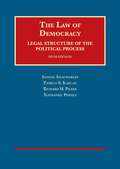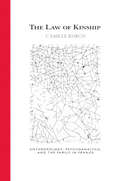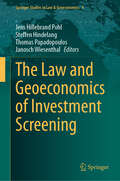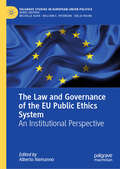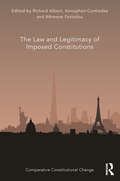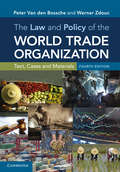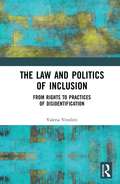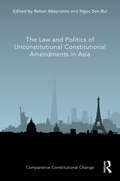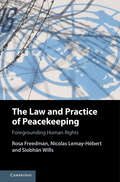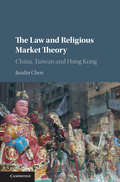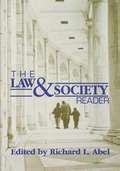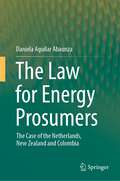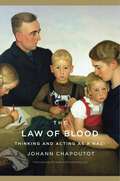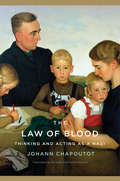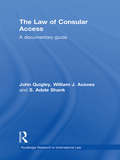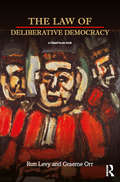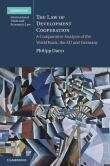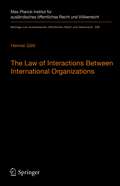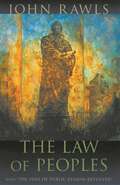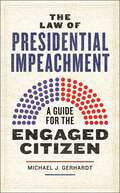- Table View
- List View
The Law Of Democracy: Legal Structure Of The Political Process
by Samuel Issacharoff Pamela Karlan Richard Pildes Nathan PersilyThis book created the field of the law of democracy, offering a systematic account of the legal construction of American democracy. This edition is the most significant revision in a decade. With the addition of Nathaniel Persily, the book now turns to a changed legal environment following such blockbuster Supreme Court decisions as Citizens United and Shelby County. This edition streamlines the coverage of the Voting Rights Act, expands the scope of coverage of campaign finance and political corruption issues, and turns to the new dispute over voter access to the ballot. The basic structure of the book continues to follow the historical development of the individual right to vote; current struggles over gerrymandering; the relationship of the state to political parties; the constitutional and policy issues surrounding campaign-finance reform; and the tension between majority rule and fair representation of minorities in democratic bodies.
The Law Of Kinship
by Camille RobcisIn France as elsewhere in recent years, legislative debates over single-parent households, same-sex unions, new reproductive technologies, transsexuality, and other challenges to long-held assumptions about the structure of family and kinship relations have been deeply divisive. What strikes many as uniquely French, however, is the extent to which many of these discussions-whether in legislative chambers, courtrooms, or the mass media-have been conducted in the frequently abstract vocabularies of anthropology and psychoanalysis. In this highly original book, Camille Robcis seeks to explain why and how academic discourses on kinship have intersected and overlapped with political debates on the family-and on the nature of French republicanism itself. She focuses on the theories of Claude Levi-Strauss and Jacques Lacan, both of whom highlighted the interdependence of the sexual and the social by positing a direct correlation between kinship and socialization. Robcis traces how their ideas gained recognition not only from French social scientists but also from legislators and politicians who relied on some of the most obscure and difficult concepts of structuralism to enact a series of laws concerning the family. Levi-Strauss and Lacan constructed the heterosexual family as a universal trope for social and psychic integration, and this understanding of the family at the root of intersubjectivity coincided with the role that the family has played in modern French law and public policy. The Law of Kinship contributes to larger conversations about the particularities of French political culture, the nature of sexual difference, and the problem of reading and interpretation in intellectual history.
The Law and Consumer Credit Information in the European Community: The Regulation of Credit Information Systems
by Federico FerrettiConsumer credit information systems are the tools used by the majority of lenders to manage credit risk, with lenders accessing credit reference databases managed by third party providers to evaluate a consumer‘s credit application. So far, the subject of consumer credit reporting has been left to the predominant attention of the economic and busin
The Law and Economics of Framework Agreements
by Albano, Gian Luigi and Nicholas, Caroline Gian Luigi Albano Caroline NicholasFramework agreements have arisen in response to the well documented and high costs of public procurement procedures. The agreements have significant potential to improve procedural efficiency in public procurement, but are complex to operate. Inadequate preparation and implementation can also frustrate their potential both to tackle waste, abuse and corruption and to enhance value for money. In this enlightening book, Gian Luigi Albano and Caroline Nicholas look at the key decisions required for designing and using framework agreements and address both legal and economic issues to give the reader a clear understanding of the planning, variables and flexibility needed for efficient implementation. This book will be of interest to policy makers, lawyers and public procurement practitioners who want to deepen their understanding of the legal and economic issues surrounding framework agreements.
The Law and Economics of a Sustainable Energy Trade Agreement
by Ricardo Meléndez-Ortiz Richard Samans Gary C. HufbauerThe widely accepted need to reduce the world's dependence on fossil fuels and move instead to low-carbon, renewable alternatives faces a host of challenges. Whilst the greatest challenges remain in engineering, political and public policy issues continue to play a very important role. This volume, which consists of contributions from leading figures in the field, presents the case for a Sustainable Energy Trade Agreement (SETA). It shows that by addressing barriers to trade in goods and services relevant for the supply of clean energy, such an agreement would foster the crucial scaling-up of clean energy supply and promote a shift away from fossil fuels. In doing so it illustrates how the agreement would help to address a number of overarching sustainable development priorities, including the urgent threat of climate change, enhanced energy access and improved energy security. The book will appeal to academics and policymakers working on the interface of trade and energy policy. Proposes a new trade agreement that will appeal to those who understand the potential of trade to contribute to sustainable development and wish to see progress. Provides a concrete positive contribution to climate action, which contrary to other climate policies comes at a low cost, with benefits for all involved. Provides rich and groundbreaking analysis, with leading experts developing their ideas in an accessible manner.
The Law and Geoeconomics of Investment Screening (Springer Studies in Law & Geoeconomics #4)
by Steffen Hindelang Jens Hillebrand Pohl Thomas Papadopoulos Janosch WiesenthalThis volume presents pioneering research for the purpose of developing a common analytical foundation and framework for the emerging interdisciplinary research field of investment control and national security. It deals with legal and regulatory aspects of investment controls, specifically from an international, transnational, and comparative law perspective.
The Law and Governance of the EU Public Ethics System: An Institutional Perspective (Palgrave Studies in European Union Politics)
by Alberto AlemannoThe questions at the core of this volume are the following: What are the ethics and integrity rules for the EU? How do they score compared to the integrity frameworks existing at the Member States’ level and in other democracies? How do we design these rules and ensure their enforcement in the EU? How do we improve the enforcement of EU integrity standards? Can an EU ethics system contribute to preventing or mitigating unethical conduct within the Union thus improving its democratic legitimacy? In addressing these questions, this edited volume provides a critical analysis of the existing 'EU ethical framework' while contextualising it within the unique transnational setting that characterises the EU public administration and its various institutions.
The Law and Legitimacy of Imposed Constitutions (Comparative Constitutional Change)
by Richard Albert Xenophon Contiades Alkmene FotiadouConstitutions are often seen as the product of the free will of a people exercising their constituent power. This, however, is not always the case, particularly when it comes to ‘imposed constitutions’. In recent years there has been renewed interest in the idea of imposition in constitutional design, but the literature does not yet provide a comprehensive resource to understand the meanings, causes and consequences of an imposed constitution. This volume examines the theoretical and practical questions emerging from what scholars have described as an imposed constitution. A diverse group of contributors interrogates the theory, forms and applications of imposed constitutions with the aim of refining our understanding of this variation on constitution-making. Divided into three parts, this book first considers the conceptualization of imposed constitutions, suggesting definitions, or corrections to the definition, of what exactly an imposed constitution is. The contributors then go on to explore the various ways in which constitutions are, and can be, imposed. The collection concludes by considering imposed constitutions that are currently in place in a number of polities worldwide, problematizing the consequences their imposition has caused. Cases are drawn from a broad range of countries with examples at both the national and supranational level. This book addresses some of the most important issues discussed in contemporary constitutional law: the relationship between constituent and constituted power, the source of constitutional legitimacy, the challenge of foreign and expert intervention and the role of comparative constitutional studies in constitution-making. The volume will be a valuable resource for those interested in the phenomenon of imposed constitutionalism as well as anyone interested in the current trends in the study of comparative constitutional law.
The Law and Policy of The World Trade Organization
by Peter Van den Bossche Werner ZdoucSince its first edition, this textbook has been the first choice of teachers and students alike, due to its clear introduction to the basic principles of the multilateral trading system and its detailed examination of the law of the World Trade Organization. The third edition continues to explore the institutional and substantive law of the WTO. Material has been restructured to closely align with teaching approaches making it even more user-friendly. It has been updated to incorporate all new developments in the WTO's body of case law. Questions and assignments are integrated to allow students to assess their understanding, while chapter summaries reinforce learning. Chapters end with an exercise reflecting real-life trade problems: these challenge students (and practitioners) and enable them to hone their analytical skills. This title is an essential tool for all WTO law students and will also serve as the practitioner's introductory guide to the WTO.
The Law and Policy of the World Trade Organization: Text, Cases and Materials
by Peter Werner Zdouc Van Den BosscheSince its first edition, this textbook has been the first choice of teachers and students alike, due to its clear introduction to the basic principles of the multilateral trading system and its detailed examination of the law of the World Trade Organization. The third edition continues to explore the institutional and substantive law of the WTO. Material has been restructured to closely align with teaching approaches making it even more user-friendly. It has been updated to incorporate all new developments in the WTO's body of case law. Questions and assignments are integrated to allow students to assess their understanding, while chapter summaries reinforce learning. Chapters end with an exercise reflecting real-life trade problems: these challenge students (and practitioners) and enable them to hone their analytical skills. This title is an essential tool for all WTO law students and will also serve as the practitioner's introductory guide to the WTO.
The Law and Politics of Inclusion: From Rights to Practices of Disidentification
by Valeria VendittiOn the one hand, inclusion constitutes a powerful framework of political agency, as people can gain access to forms of recognition granting legal protection and social visibility. On the other hand, inclusion requires their adherence to fixed matrices incorporating specific and limited forms of life. This opposition reflects a similar division within the academic field: between liberal advocates of inclusion and those who regard it as a form of assimilation, where differences are absorbed and tempered. Uncovering the deficiencies in both viewpoints, this book analyzes inclusion by attending to the active role of subjects looking for inclusion, and mobilizing inclusive processes. Inclusion is thus reconceived as an ongoing, engaging movement of category-production, according to which there is no straightforward opposition between effective inclusion and assimilation. The book thus draws the idea of inclusion out of this opposition in order to delineate a form of political connectedness based on smaller social networks of solidarity that, although entailing some sort of normativity, are nevertheless characterized by fluidity and proximity. In this way, inclusion comes to be more productively, and more plausibly, reframed: as a web in which inclusive processes appear as moments of the renegotiation and rearticulation of a subjectivity in constant flux.
The Law and Politics of Unconstitutional Constitutional Amendments in Asia (Comparative Constitutional Change)
by Rehan Abeyratne and Ngoc Son BuiThis book explains how the idea and practice of UCA are shaped by, and inform, constitutional politics through various social and political actors, and in both formal and informal amendment processes, across Asia. This is the first book-length study of the law and politics of unconstitutional constitutional amendments in Asia. Comprising ten case studies from across the continent, and four broader, theoretical chapters, the volume provides an interdisciplinary, comparative perspective on the rising phenomenon of unconstitutional constitutional amendments (UCA) across a range of political, legal, and institutional contexts. The volume breaks new ground by venturing beyond the courts to consider UCA not only as a judicial doctrine, but also as a significant feature of political and intellectual discourse. The book will be a valuable reference for law and political science researchers, as well as for policymakers and NGOs working in related fields. Offering broad coverage of jurisdictions in East Asia, Southeast Asia and South Asia, it will be useful to scholars and practitioners within Asia as well as to those seeking to better understand the law and politics of the region.
The Law and Practice of Peacekeeping: Foregrounding Human Rights
by Rosa Freedman Nicolas Lemay-Hébert Siobhán WillsIn an increasingly complex world, it is more crucial than ever to have a full picture of how international peacekeeping can be a force for good, but can also have potentially negative impacts on host communities. After thirteen years of presence in Haiti, the highly controversial United Nations Stabilization Mission in Haiti has now withdrawn. The UN's legacy in Haiti is not all negative, but it does include sexual scandals, the divisive use of force to 'clean up' difficult neighbourhoods as well as a cholera epidemic, brought inadvertently by Nepalese peacekeepers that killed more than 8,000 Haitians and infected more than 600,000. This book presents a unique multi-disciplinary analysis of the legacy of the mission for Haiti. It presents an innovative account of contemporary international peacekeeping law and practice, arguing for a new model of accountability, going beyond the outdated immunity mechanisms to foreground human rights.
The Law and Religious Market Theory: China, Taiwan and Hong Kong
by Jianlin ChenWith comparative case studies from China, Taiwan and Hong Kong, Jianlin Chen's new work offers a fresh, descriptive and normative perspective on law and religion. This presentation of the original Law and Religious Market Theory employs an interdisciplinary approach that sheds light on this subject for scholars in legal and sociological disciplines. It sets out the precise nature of religious competition envisaged by the current legal regimes in the three jurisdictions and analyses how certain restrictions on religious practices may facilitate normatively desirable market dynamics. This updated and invaluable resource provides a new and insightful investigation into this fascinating area of law and religion in Greater China today.
The Law and Society Reader
by Richard L. AbelThis book seeks to provide answers to everything you ever wanted to know about the law—except what the rules are or ought to be. For centuries, the law has been considered a neutral, objective arena that sets societal standards and in which conflicting forces resolve disputes. More recently, however, the interaction between law and society has been recognized as a two-way street: society clearly exacts a considerable influence on the practice and evolution of law. Further, the discrepancy between what the law mandates and what the social reality is has served as evidence of the chasm between theory and practice, between the abstraction of law and its actual societal effects. Examining such issues as the limits of legal change and the capacity of law to act as a revolutionary agent, the essays in this book offer a well-rounded introduction to the relationship between law and society. By focusing on flashpoint issues in legal studies—equality, consciousness and ideology, social control--and making ample use of engaging case studies, The Law and Society Review provides an invaluable resource for scholars and students alike.
The Law for Energy Prosumers: The Case of the Netherlands, New Zealand and Colombia
by Daniela Aguilar AbaunzaThis book argues that law has a vital role in shaping the electricity system to enable a more active role for consumers in liberalizsed electricity industries. To do that, this book offers a unique legal perspective of the Netherlands, New Zealand and Colombia to help understand some of the current legal approaches to prosumers and therefore the legal challenges and opportunities facing. Law and regulation have the role of creating a level playing field for emerging participants, such as prosumers, to participate and compete in the market together with traditional actors, bringing not only more competition but also representing a more sustainable, environmental and democratic way to supply energy. Furthermore, law and regulation have the role of responding to innovation and creating space for technological advances to procure the changes in the industry without delay. This book examines some of the legal barriers for the raise of energy prosumers. The traditional role of the distributor when responding to increasing distributed generation in the network; prosumers unable to decide to whom they can sell their electricity to; the price of the energy or even whether to participate more actively in demand response programs. A further issue is the lack of clarity about whether small prosumers are entitled to consumer protection rights and legal challenges regarding configuration, access to the network, access to markets and strict unbundling rules for community energy projects. This book provides a clear, analytical, and informed approach to understanding the regulatory framework around energy prosumers. It will appeal to policy makers, lawyers, individuals, business entrepreneurs or communities wanting to engage in energy projects, as well as academics, researchers and students
The Law of Blood: Thinking and Acting as a Nazi
by Johann ChapoutotThe scale and the depth of Nazi brutality seem to defy understanding. What could drive people to fight, kill, and destroy with such ruthless ambition? Observers and historians have offered countless explanations since the 1930s. According to Johann Chapoutot, we need to understand better how the Nazis explained it themselves. We need a clearer view, in particular, of how they were steeped in and spread the idea that history gave them no choice: it was either kill or die. Chapoutot, one of France’s leading historians, spent years immersing himself in the texts and images that reflected and shaped the mental world of Nazi ideologues, and that the Nazis disseminated to the German public. The party had no official ur-text of ideology, values, and history. But a clear narrative emerges from the myriad works of intellectuals, apparatchiks, journalists, and movie-makers that Chapoutot explores. The story went like this: In the ancient world, the Nordic-German race lived in harmony with the laws of nature. But since Late Antiquity, corrupt foreign norms and values—Jewish values in particular—had alienated Germany from itself and from all that was natural. The time had come, under the Nazis, to return to the fundamental law of blood. Germany must fight, conquer, and procreate, or perish. History did not concern itself with right and wrong, only brute necessity. A remarkable work of scholarship and insight, The Law of Blood recreates the chilling ideas and outlook that would cost millions their lives.
The Law of Blood: Thinking and Acting as a Nazi
by Johann ChapoutotThe scale and the depth of Nazi brutality seem to defy understanding. What could drive people to fight, kill, and destroy with such ruthless ambition? Observers and historians have offered countless explanations since the 1930s. According to Johann Chapoutot, we need to understand better how the Nazis explained it themselves. We need a clearer view, in particular, of how they were steeped in and spread the idea that history gave them no choice: it was either kill or die. Chapoutot, one of France’s leading historians, spent years immersing himself in the texts and images that reflected and shaped the mental world of Nazi ideologues, and that the Nazis disseminated to the German public. The party had no official ur-text of ideology, values, and history. But a clear narrative emerges from the myriad works of intellectuals, apparatchiks, journalists, and movie-makers that Chapoutot explores. The story went like this: In the ancient world, the Nordic-German race lived in harmony with the laws of nature. But since Late Antiquity, corrupt foreign norms and values—Jewish values in particular—had alienated Germany from itself and from all that was natural. The time had come, under the Nazis, to return to the fundamental law of blood. Germany must fight, conquer, and procreate, or perish. History did not concern itself with right and wrong, only brute necessity. A remarkable work of scholarship and insight, The Law of Blood recreates the chilling ideas and outlook that would cost millions their lives.
The Law of Collaborative Defence Procurement in the European Union
by Heuninckx Baudouin McipsStates increasingly cooperate to buy expensive defence equipment, but the management and legal aspects of these large collaborative procurement programmes are complex and not well understood. The Law of Collaborative Defence Procurement in the European Union analyses how these programmes are managed, and highlights areas which require improvement. The book addresses the law applicable to these programmes, which is built upon a four-layer 'matryoshka doll' of legal relationships at the crossroads of public international law, EU law and domestic law. Using practical examples, the book makes proposals for clarifying the legal basis and improving the efficiency of defence equipment cooperation among EU member states. By covering a broad scope of legal issues, this analysis goes beyond the defence sector and is relevant to centralised or joint purchasing and procurement activities of international organisations, providing invaluable information for practitioners, policy-makers and academics aiming to analyse or improve these projects.
The Law of Consular Access: A Documentary Guide (Routledge Research in International Law)
by John Quigley William J. Aceves Adele ShankOver the past decade, there has been an explosion of litigation at the international and domestic levels concerning consular access for foreign nationals charged with a criminal offence. The issue has complicated relations between countries, with the majority of litigation involving the United States, which has adopted a restrictive view of the consular access obligation. This book brings together for the first time relevant documentary sources on the law of consular access. The book includes significant excerpts alongside commentary on the documents, allowing readers to draw their own conclusions. While presenting information on the Vienna Convention on Consular Relations, the book presents other sources, including bilateral consular agreements, multilateral treaties, and key court cases from various jurisdictions. Many of these sources are not readily accessible. The Law of Consular Access will be of interest to scholars of international law, human rights, and international relations. It will also be of interest to private and government lawyers, as well as diplomats and consuls.
The Law of Deliberative Democracy
by Ron Levy Graeme OrrLaws have colonised most of the corners of political practice, and now substantially determine the process and even the product of democracy. Yet analysis of these laws of politics has been hobbled by a limited set of theories about politics. Largely absent is the perspective of deliberative democracy – a rising theme in political studies that seeks a more rational, cooperative, informed, and truly democratic politics. Legal and political scholarship often view each other in reductive terms. This book breaks through such caricatures to provide the first full-length examination of whether and how the law of politics can match deliberative democratic ideals. Essential reading for those interested in either law or politics, the book presents a challenging critique of laws governing electoral politics in the English-speaking world. Judges often act as spoilers, vetoing or naively reshaping schemes meant to enhance deliberation. This pattern testifies to deliberation’s weak penetration into legal consciousness. It is also a fault of deliberative democracy scholarship itself, which says little about how deliberation connects with the actual practice of law. Superficially, the law of politics and deliberative democracy appear starkly incompatible. Yet, after laying out this critique, The Law of Deliberative Democracy considers prospects for reform. The book contends that the conflict between law and public deliberation is not inevitable: it results from judicial and legislative choices. An extended, original analysis demonstrates how lawyers and deliberativists can engage with each other to bridge their two solitudes.
The Law of Development Cooperation
by Philipp DannDevelopment interventions are agreed by states and international organisations which administer public development funds of huge proportions. They have done so with debatable success, but, unlike the good governance of recipients, the rules applying to donors have hitherto received little scrutiny. This analysis of the normative structures and conceptual riddles of development co-operation argues that development co-operation is increasingly structured by legal rules and is therefore no longer merely a matter of politics, economics or ethics. By focusing on the rules of development co-operation, it puts forward a new perspective on the institutional law dealing with the process, instruments and organisation of this co-operation. Placing the law in its theoretical and political context, it provides the first comparative study on the laws of foreign aid as a central field of global public policy and asks how accountability, autonomy and human rights can be preserved while combating poverty.
The Law of Interactions Between International Organizations: A Framework for Multi-Institutional Labour Governance (Beiträge zum ausländischen öffentlichen Recht und Völkerrecht #299)
by Henner GöttThe book analyses how international law addresses interactions between international organizations. In labour governance, these interactions are ubiquitous. They offer each organization an opportunity to promote its model of labour governance, yet simultaneously expose it to adverse influence from others. The book captures this ambivalence and examines the capacity of international law to mitigate it. Based on detailed case studies of mutual influence between the International Labour Organization, the World Bank, and the Council of Europe, the book offers an in-depth analysis of the pertinent law and its key challenges, both at institutional and inter-organizational level. The author envisions a law of inter-organizational interactions as a normative framework structuring interactions and enhancing the effectiveness and legitimacy of multi-institutional governance.
The Law of Peoples: With “The Idea of Public Reason Revisited”
by John RawlsThis book consists of two parts: “The Law of Peoples,” a major reworking of a much shorter article by the same name published in 1993, and the essay “The Idea of Public Reason Revisited,” first published in 1997. Taken together, they are the culmination of more than fifty years of reflection on liberalism and on some of the most pressing problems of our times by John Rawls.“The Law of Peoples” extends the idea of a social contract to the Society of Peoples and lays out the general principles that can and should be accepted by both liberal and non-liberal societies as the standard for regulating their behavior toward one another. In particular, it draws a crucial distinction between basic human rights and the rights of each citizen of a liberal constitutional democracy. It explores the terms under which such a society may appropriately wage war against an “outlaw society” and discusses the moral grounds for rendering assistance to non-liberal societies burdened by unfavorable political and economic conditions.“The Idea of Public Reason Revisited” explains why the constraints of public reason, a concept first discussed in Political Liberalism (1993), are ones that holders of both religious and non-religious comprehensive views can reasonably endorse. It is Rawls’s most detailed account of how a modern constitutional democracy, based on a liberal political conception, could and would be viewed as legitimate by reasonable citizens who on religious, philosophical, or moral grounds do not themselves accept a liberal comprehensive doctrine—such as that of Kant, or Mill, or Rawls’s own “Justice as Fairness,” presented in A Theory of Justice (1971).
The Law of Presidential Impeachment: A Guide for the Engaged Citizen
by Michael J. GerhardtA clear and comprehensive overview of presidential impeachment from a leading expert in the fieldAs a result of Donald Trump’s presidency, impeachment was once again thrust into the spotlight of American political discussion. However, its history goes back to the very founding of the nation, when American colonists, remembering their grievances against their former king, entrenched the process in their new Constitution.The Law of Presidential Impeachment breaks down both the law and politics of this process, providing a comprehensive, nonpartisan, and up-to-date explanation of the Constitution’s various mechanisms for holding presidents accountable for their misdeeds. Based on a lifetime of scholarly research, as well as unique experience as a witness and consultant in the impeachment trials of Bill Clinton and Donald Trump, Michael J. Gerhardt’s new book takes the reader back to the basics of presidential impeachments. Rather than provide reasons for or against impeaching particular presidents, he explains the law and procedures that govern impeachment, examining a number of significant, yet under-explored, issues and themes. Gerhardt offers new perspectives on the subject, arguing that it cannot be properly understood in a vacuum, but must instead be viewed in the context of its coordination with such other mechanisms as criminal prosecutions, censure, elections, congressional oversight, and the Fourteenth and Twenty-Fifth Amendments.The Law of Presidential Impeachment will be an invaluable, accessible guide for future generations, giving them a succinct yet remarkably nuanced understanding of this core aspect of our executive branch and overarching governmental system.
